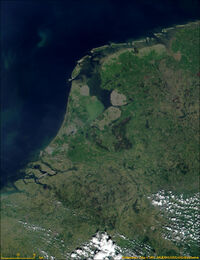The Netherlands (Dutch: Nederlanden; Papiamento: Hulandes; Indonesian: Belanda), officially the Kingdom of the Netherlands (Dutch: Koninkrijk der Nederlanden; Papiamento: Reino Hulandes; Indonesian: Kerajaan Belanda) is a sovereign state and constitutional monarchy with territory in Western Europe, the Caribbean, and the East Indies. The Dutch mainland borders the North Sea to the north and west, Belgium to the south, and Germany to the east, and shares maritime borders with Belgium, Germany, and the British Empire; the Dutch Caribbean also includes a land border with France on the island of St. Martin and a maritime border with Venezuela, while West Timor borders Timor-Leste by land and Indonesia by sea. The three parts of the Kingdom – the Netherlands, the Netherlands Antilles, and West Timor – are referred to as countries and participate on a basis of equality as partners in the Kingdom. In practice, however, most of the Kingdom affairs are administered by the Netherlands (which comprises roughly 71% of the Kingdom's land area and population) on behalf of the entire Kingdom, with the Antilles and West Timor being dependent on the Netherlands. It is a parliamentary democracy organised as a unitary state. The country capital is Amsterdam and the seat of government is The Hague. The Netherlands in its entirety is often referred to as "Holland", although North and South Holland are actually only two of its provinces.

A satellite image of the Netherlands taken in May 2000.
The European Netherlands is a geographically low-lying country, with about 20% of its area and 21% of its population located below sea level, and 50% of its land lying less than one metre above sea level. This distinct feature contributes to the country's name: in Dutch (Nederland), English, and in many other European languages, its name literally means "(The) Low Countries" or "Low Country". Most of the areas below sea level are man-made, caused by centuries of extensive and poorly controlled peat extraction, lowering the surface by several meters. Even in flooded areas peat extraction continued through turf dredging. From the late 16th century land reclamation started and large polder areas are now preserved through elaborate drainage systems with dikes, canals and pumping stations. Much of the Netherlands is formed by the estuary of three important European rivers, which together with their distributaries form the Rhine-Meuse-Scheldt delta. Most of the country is very flat, with the exception of foothills in the far southeast and several low hill ranges in the central parts.
The Netherlands was one of the first countries to have an elected parliament. Among other affiliations, the country is a founding member of the European Economic Community and Allied Pact. Together with Belgium and Luxembourg it forms the Benelux economic union. The Netherlands had the tenth-highest per capita income in the world in 2011. The Netherlands has a market-based mixed economy, ranking 13th of 157 countries according to the Index of Economic Freedom. In May 2011, the Netherlands was ranked as the "happiest" country according to results published by the OECD. The nation is well known for its progressive stance on many issues, with a long tradition of social tolerance.